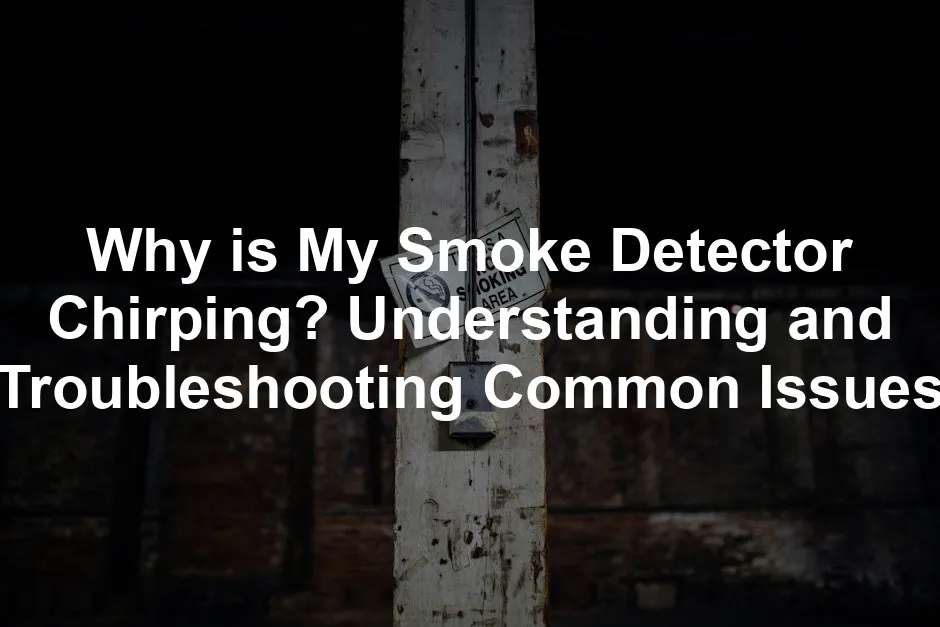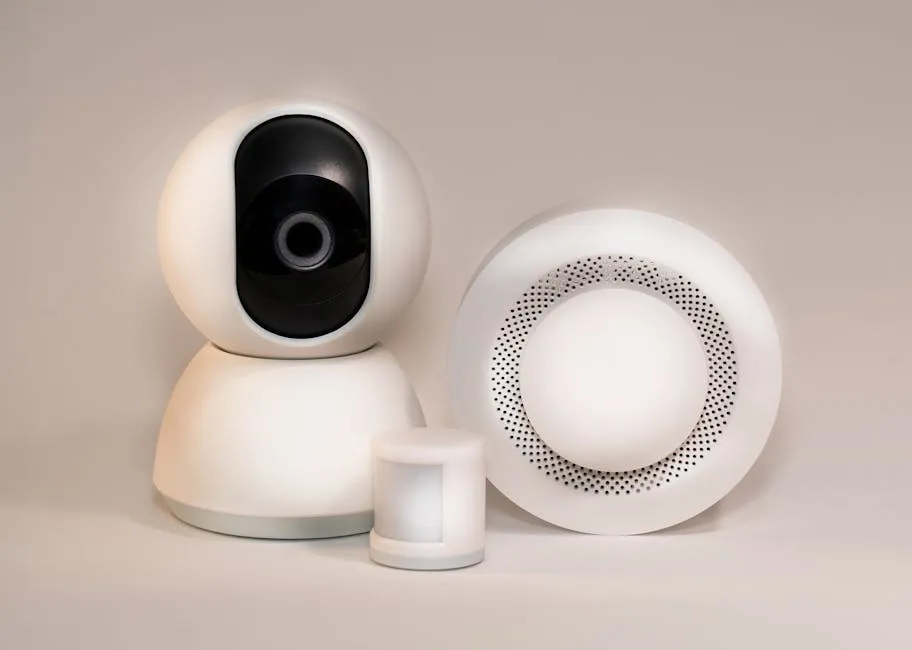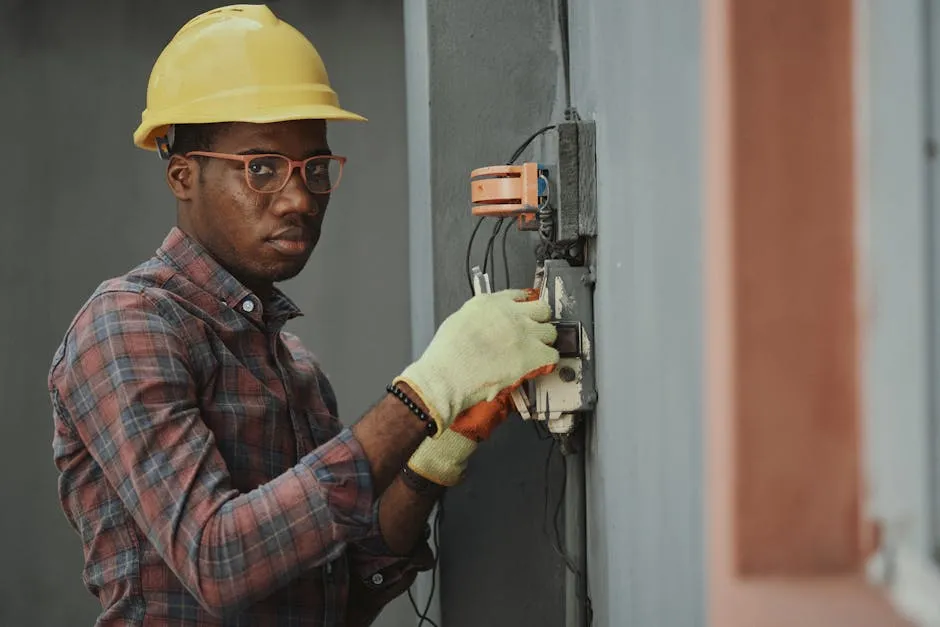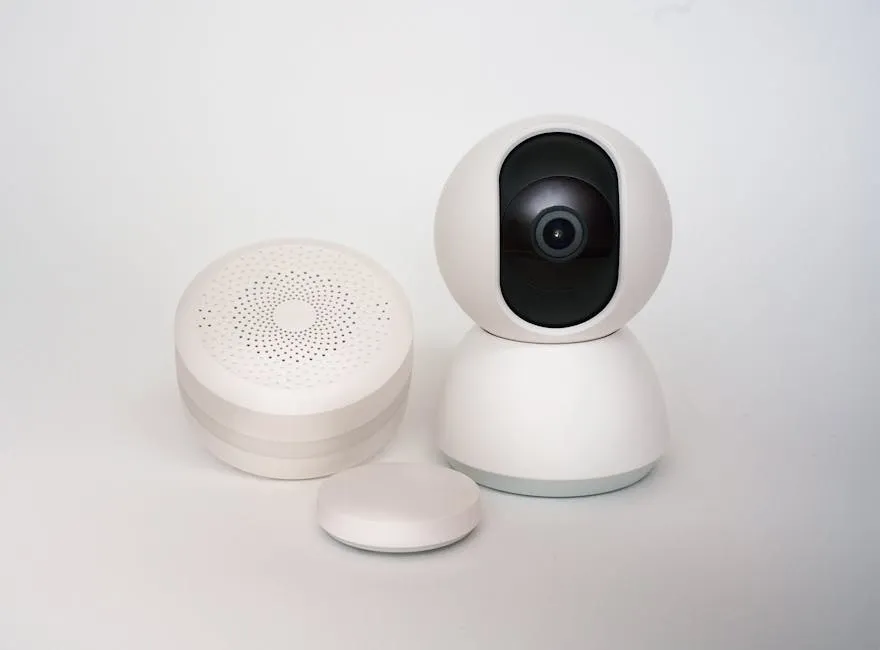
Why is My Smoke Detector Chirping? Understanding and Troubleshooting Common Issues
Introduction
Smoke detectors play a critical role in keeping your home safe. They alert you to potential fire hazards, allowing time for escape. However, a chirping smoke detector can be quite frustrating. This article will look at the reasons behind that chirping sound and provide solutions to resolve the issue effectively.
Summary and Overview
Chirping smoke detectors indicate various issues that require attention. Common causes include low batteries, dust accumulation, detector malfunctions, or even environmental factors. Understanding these signals is vital for your safety. This article covers essential troubleshooting steps and maintenance tips. We’ll also touch on the lifespan of smoke detectors to help you stay proactive in your home safety efforts.
Environmental factors can significantly impact the performance of smoke detectors. Learn more about how environmental factors contribute to glossophobia in the workplace.
Common Causes of Smoke Detector Chirping
Low Battery Alerts
If your smoke detector chirps every 30 to 60 seconds, it’s likely a low battery alert. This sound is a reminder for you to replace the batteries promptly. Delaying this can leave you vulnerable in case of a fire. Most smoke detectors require a 9V battery, either alkaline or lithium. While alkaline batteries need replacing every six months, lithium batteries can last up to ten years. For peace of mind, consider using lithium batteries, especially for hard-to-reach detectors. Energizer 9V Lithium Battery is an excellent choice for your smoke detectors!

Dust and Debris Accumulation
Dust can significantly affect your smoke detector’s performance. When dust accumulates, it may cause false alarms or chirping alerts. Regular cleaning is essential to keep your detector functioning correctly. Use a vacuum cleaner or a can of compressed air to remove dust from the unit. Make sure to clean it at least once every six months. This simple maintenance task ensures your smoke detector remains sensitive to actual fire hazards. To make cleaning easier, consider investing in a Black+Decker Dustbuster Handheld Vacuum. It’s lightweight and perfect for quick clean-ups!

Faulty or Outdated Detectors
Smoke detectors have a lifespan of about seven to ten years. If yours chirps despite having fresh batteries, it may be time for a replacement. Look for signs of malfunction, such as inconsistent alarms or a failure to respond during tests. Checking the manufacture date on your smoke detector can help determine if it’s time for a new one. Don’t compromise on safety; replacing outdated units ensures you have reliable fire protection in your home. Consider upgrading to a modern model like the Nest Protect Smoke and Carbon Monoxide Detector for added peace of mind!

Environmental Factors
Humidity, temperature, and placement can affect smoke detector performance. High humidity or extreme temperatures may trigger false alarms. For example, placing a detector near kitchens or bathrooms can lead to unnecessary chirping. Steam from showers or cooking can confuse the sensitive sensors.
To ensure optimal performance, place detectors away from these areas. Ideally, install them in hallways and on every level of your home. This helps maintain clear air quality around the device. Regularly check the placement to avoid common pitfalls that lead to chirping.

Electrical Issues
Electrical surges can impact smoke alarms significantly. When power fluctuations occur, they may cause your alarms to chirp unexpectedly. It’s crucial to check the wiring and connections. Loose or corroded wires can lead to unreliable performance.
If you notice persistent chirping despite battery changes, consider consulting a professional. They can assess your electrical system and ensure everything is functioning correctly. Don’t overlook this aspect, as it directly affects your home’s safety. If you need reliable electrical support, check out the Brother P-touch PTD210 Label Maker to label your wires and keep everything organized!

Troubleshooting Steps
How to Change the Battery
Changing the battery in your smoke detector is straightforward. Start by locating the battery compartment, usually on the back or side of the unit.
- Open the cover to access the battery.
- Remove the old battery and dispose of it properly.
- Insert a new 9V battery, ensuring the positive and negative ends align correctly.
- Close the compartment securely.
After replacing the battery, test the alarm by pressing the test button. This confirms the installation was successful and your alarm is ready to protect your home. Remember to change batteries at least twice a year to stay safe. If you’re in need of a reliable battery option, the Amazon Basics 9V Alkaline Battery is a great choice for your smoke detectors!

Cleaning Your Smoke Detector
Keeping your smoke detector clean is crucial for its performance. Dust and debris can interfere with its sensors, leading to false alarms or chirping. To clean your smoke detector, first, ensure it’s powered off.
Use a vacuum cleaner with a soft brush attachment to gently remove dust from the outside. A microfiber cloth can help wipe the surface and vents. For tougher spots, consider using compressed air to clear out any stubborn dust. Aim to clean your smoke detector every six months. Regular maintenance helps ensure your alarms function correctly when you need them most. If you’re looking for quality cleaning supplies, consider the Amazon Basics Microfiber Cleaning Cloths for a streak-free shine!

Resetting the Smoke Alarm
Resetting your smoke alarm can resolve persistent chirping issues. For battery-operated alarms, start by removing the battery. Hold the test button for about 15 seconds to drain any residual charge. Then, reinstall the battery securely.
For hardwired alarms, turn off the main power and disconnect the power cable. Remove the backup battery and press the test button for 15 seconds. Reconnect everything, and turn the power back on. Remember to reset your alarm after changing the battery. If it continues chirping, it may signal a malfunction that needs further investigation. If you’re looking for a more advanced smoke detection system, consider the Honeywell HPA300 Air Purifier for comprehensive air quality monitoring!

When to Replace Your Smoke Detector
Knowing when to replace your smoke detector is vital for safety. If your alarm chirps despite having fresh batteries, it’s likely time for a new unit. Look for indicators like frequent false alarms, failure to respond during tests, or an alarm that’s over ten years old.
Most smoke detectors have a lifespan of about 7 to 10 years. Regularly check the manufacture date on your device. When it’s time to replace, dispose of the old detector according to local regulations. This ensures proper safety measures are followed in your home. If you’re looking for a reliable replacement option, consider the Kidde i9010 Sealed Lithium Battery Operated Smoke Alarm for reliable fire safety!

Conclusion
In summary, a chirping smoke detector is a signal that requires your attention. Common causes include low batteries, dust accumulation, and outdated units. Regular maintenance is crucial for ensuring your smoke detectors function effectively. Don’t delay action when you hear that chirping sound. Check your alarms today to keep your home safe and secure. Your safety is worth the effort!
FAQs
What does it mean when my smoke detector chirps every 30 seconds?
If your smoke detector chirps every 30 seconds, it likely indicates a low battery. This sound serves as a reminder to replace the battery immediately. To resolve this issue, open the detector, remove the old battery, and install a fresh one. Remember to test the alarm after changing the battery to ensure it’s functioning properly.
Can I stop my smoke detector from chirping by removing the battery?
While removing the battery may temporarily silence the chirping, it is not a long-term solution. Doing so leaves your smoke detector inoperable, which can be dangerous. Instead, replace the battery promptly to ensure your detector remains functional and ready to alert you in case of smoke or fire.
How often should I test my smoke detector?
It’s recommended to test your smoke detector at least once a month. Additionally, replace the batteries twice a year. You can conveniently schedule these tasks around seasonal changes, such as daylight saving time, to ensure your alarms are always in good working order.
Why does my smoke detector chirp even after changing the battery?
If your smoke detector continues to chirp after replacing the battery, dust or debris may be obstructing the sensor. Another possibility is that the alarm is nearing the end of its lifespan, which typically lasts 7 to 10 years. Check for dirt, clean the unit, and consider replacing it if the chirping persists.
When should I replace my smoke detector?
You should replace your smoke detector every 7 to 10 years, depending on the model. Signs that indicate a need for replacement include frequent chirping, failure to respond during tests, or an alarm that is older than the recommended lifespan. Always check the manufacture date on the back of the unit to stay proactive about your safety.
Please let us know what you think about our content by leaving a comment down below!
Thank you for reading till here 🙂
All images from Pexels




